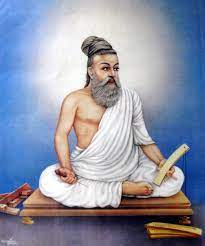- Thiruvalluvar, an important character in Tamil culture, has recently sparked outrage over how the TN Governor and Chief Minister have represented his image and clothing.
About Thiruvalluvar Day.
- In Tamil Nadu, Thiruvalluvar Day is traditionally observed on the 15th or 16th of January.
- The day is quite similar to Raksha Bandhan, when ladies pray for the well-being of their brothers.
- The ladies carry out the rituals in the morning. As part of the tradition, rice is placed in the middle of a leaf, while the ladies pray for their brothers’ health.
- This is followed by an Arati, after which turmeric water is sprinkled on the “kolam”.
Who was Thiruvalluvar?
- Thiruvalluvar, also known as Valluvar, is a celebrated Tamil poet-saint whose popularity transcends caste and religious borders.
- The exact time period in which he lived and his religious membership are still debated.
- Some situate him in the third or fourth century, while others believe he lived in the eighth or ninth century.
- His religious affiliation varies; some consider him a Hindu, others associate him with Jainism, while Dravidian parties revere him as a saint since he rejected the caste system.
- Thirukkural, his primary work, is made up of 1330 couplets (kurals) divided into three sections that educate about dharma (virtue), artha (wealth), and kama (love).
Significance of Robes
- Political influence has shaped depictions of Thiruvalluvar, particularly his dress, despite sparse historical material.
- Scholar Insights: According to scholars, Thiruvalluvar’s religious allegiance was most likely Jain, rather than Hindu or Dravidian. His look, with white robes, is a more contemporary version.
- Disputed Symbolism: The debate about the colour of Thiruvalluvar’s robes derives from competing political intentions and readings of his lyrics.
Thiruvalluvar’s Relevance Today
- Archaeological discoveries: Recent discoveries at Keeladi in Madurai have stretched the history of Tamilagam (Sangam Era) back at least 300 years, supporting Dravidian historians’ claims to ancient ancestry.
- Keeladi Context: The Keeladi results have sparked dispute amongst Hindutva supporters and those who defend the Dravidian viewpoint. While no Hindu idols were discovered in Keeladi, opinions differ on the existence of ‘Hindu’ characteristics.
Source: https://indianexpress.com/article/explained/explained-culture/tamil-nadu-cm-governor-thiruvalluvar-saffron-9111878/

